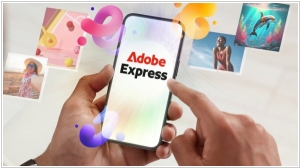NetSuite vs SAP ERP
May 18, 2023 | Author: Michael Stromann
21
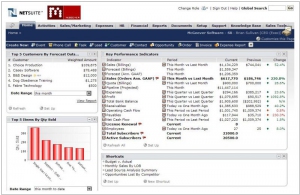
NetSuite is the leading vendor of cloud-based Software-as-a-Service integrated business management software for mid-market enterprises and divisions of large companies. NetSuite's cloud business management system including ERP / accounting, order management / inventory, CRM, professional services automation (PSA), and Ecommerce.
24
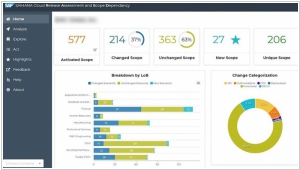
SAP’s intelligent ERP solutions are the Digital Core that enable businesses to integrate end-to-end cross functional next generation business processes so that companies can become intelligent. SAP's cloud ERP solutions use intelligent technologies to help you grow, innovate, and optimize time and resources – no matter the size of your business.
NetSuite and SAP ERP are both popular enterprise resource planning (ERP) solutions, but they have distinct differences in terms of features, scalability, and target markets. NetSuite is a cloud-based ERP platform that provides comprehensive business management functionalities, including financial management, inventory management, CRM, e-commerce, and more. It is particularly popular among small to mid-sized businesses due to its ease of implementation and scalability. SAP ERP, on the other hand, is a robust and highly customizable ERP system that caters to the needs of large enterprises. It offers a wide range of modules for managing various aspects of a business, including finance, supply chain, manufacturing, human resources, and more. SAP ERP provides extensive customization options, industry-specific solutions, and integration capabilities to meet the complex requirements of large organizations.
See also: Top 10 Online ERP software
See also: Top 10 Online ERP software
NetSuite vs SAP ERP in our news:
2021. SAP is buying Berlin business process automation startup Signavio
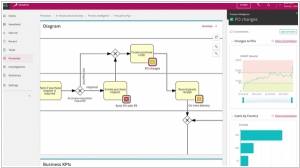
SAP has recently completed its acquisition of Signavio, a business process automation startup, for approximately $1.2 billion. This move reflects SAP's recognition of the value in adopting a more modern and cloud-native approach to address the challenges of enterprise business process automation. The ability to automate business processes through the cloud has gained significant importance, especially during the pandemic when remote work has become prevalent. By incorporating Signavio's cloud-native tool into its portfolio, SAP aims to enhance its capabilities in automating and optimizing business processes. SAP also views Signavio as a valuable addition to its business process intelligence unit, filling a crucial gap in its offerings.
2016. Oracle buys cloud ERP provider NetSuite for $9.3B
Oracle has announced its acquisition of NetSuite for an estimated amount of $9.3 billion. As per a statement by Oracle CEO Mark Hurd, both Oracle and NetSuite's cloud service offerings, targeting enterprise customers, will continue to operate and coexist in the marketplace indefinitely. NetSuite, an established player in the cloud enterprise resource planning (ERP) sector, holds a prominent position with its offerings for supply and demand tracking, inventory management, accounting, customer relationship management (CRM), and HR solutions. The ERP industry has witnessed considerable mergers and acquisitions along with consolidation in recent years. Oracle, known for its aggressive acquisition strategy, has been actively acquiring smaller companies throughout 2016, including Opower and Textura.
2012. SAP became NetSuite's customer. Business ByDesign will be closed
Most of all NetSuite loves trolling its rival - SAP. From time to time they organize anti-SAP conferences, marketing campaign a la Business ByNetsuite and produce videos like that one above. And they haven't missed the opportunity to joke on SAP at this time. At the opening of the conference SuiteWorld, Zach Nelson (CEO of NetSuite) took the stage and announced that in the past year the company has achieved their biggest ever win: ERP-giant SAP has become NetSuite's customer. The audience was shocked, and then Zach explained. ***
2011. SAP embracing Amazon and Microsoft clouds

SAP is the most slow IT giant in terms of transition to the cloud technologies. Nevertheless, it's the world's largest software company and any of its steps to the Cloud serves as an indicator for all large corporations: "if even SAP released a SaaS-solution, then SaaS-solutions can indeed be trusted" or "if even SAP offers a version for Amazon Web Services, than this platform is really enterprise-ready". This week at the SAPPhire conference, the company reported on its cloud transition steps. First of all, the SaaS ERP-service SAP Business ByDesign is already used by 500 with a target of having 1000 signed up by the end of the year. Second, SAP has announced that it's "launching" the SaaS CRM-service SAP Sales OnDemand, which will be followed by a travel management cloud service and an on-demand suite for talent management. And third, SAP has started to adapt its existing systems for the Amazon and Microsoft cloud platforms. ***
2010. Who says Enterprise Software isn’t Cool? Watch what its users can do!
In addition to focusing on new business applications and modern trends in Enterprise software, we also pay attention to how vendors promote themselves and their products. This area is shifting towards the Enterprise 2.0 style, where traditional PowerPoint presentations and image-less PDF brochures are being replaced by captivating blockbusters and show-projects. Instead of mundane descriptions, we now encounter humorous sketches illustrating the consequences of running a business without the software. Such marketing strategies grab attention and, most importantly, foster a sense of affinity towards the software, even if the software itself is not particularly user-friendly, as is the case with SAP. SAP's latest show-project, Run Better, focuses on showcasing the remarkable achievements of its users rather than emphasizing the ERP system itself. Additionally, other examples of captivating marketing can be found from Box.net, Mainsoft, and NetSuite.
2010. NetSuite fights hairballs. But makes one with Google Apps
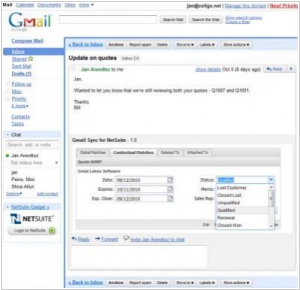
NetSuite marketing team is well known for its sense of humor. But before their humor was mainly inspired by SAP and its "stealth" launch of SaaS solution SAP Business ByDesign (that let NetSuite make its business). By the way, it's interesting that actually NetSuite drives away Oracle's customers as well as SAP's, but with respect to Oracle, the NetSuite marketers behave much more modest, because the Oracle CEO, Larry Ellison in co-owner of NetSuite. But let's go back to hairballs. What is it? According to NetSuite, the hairball - is a thing that happens when a company deploys disparate IT systems and then tries to integrate them. The conclusion is simple - use NetSuite, where everything is natively integrated. In addition to funny video NetSuite unveiled the updated system interface and seamless integration with Google Apps: ***
2010. SAP Business ByDesign goes live
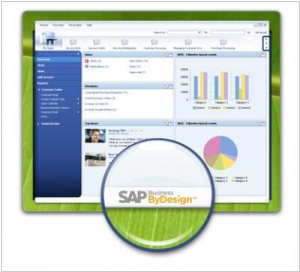
Finally, SAP has officially launched its SaaS ERP system, SAP Business ByDesign, which will compete with NetSuite, Workday and other cloud ERP solutions. As you know, it's not a fresh product. It was released 3 years ago, but due to the scalability problems, its sales were stopped, and still the system was used by fewer than 100 companies worldwide. SAP Business ByDesign is designed for SMB (50-500 employees) and primarily for manufacturing and professional services industries. It's a single multitenant service to automate all business areas, including manufacturing, financials and sales. The updated version SAP Business ByDesign 2.5 provides support for mobile devices, integration with MS Excel, custom forms and user interface based on Silverlight. But its pricing will hardly cause a revolution in SaaS sphere. ***
2010. SAP acquired Sybase to get the cloud database and mobile apps
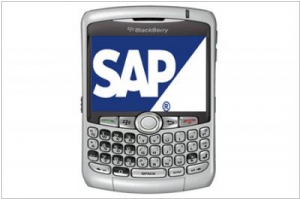
The world's largest enterprise software vendor, SAP has become even more large. For $5.8 billion SAP has acquired Sybase, the company primarily known as one of the leading database and enterprise mobile applications vendor. Until now, SAP didn't have its own database and provided customers a freedom of choice in this matter. At the same time SAP was reselling about a billion dollars worth of Oracle databases - a bad idea considering SAP and Oracle are in direct competition. However, it is unlikely that Sybase database will replace all other database middleware in the traditional SAP ERP deployments. On the other hand, it can be very useful for cloud deployments and creation of the own SaaS platform for SAP Business ByDesign. Because Sybase has recently released the cloud version of its database, which is primarily designed for Amazon EC2. ***
2009. Netsuite invented Social ERP
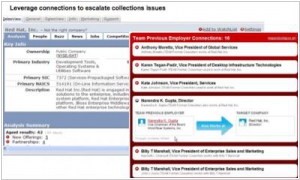
Netsuite has already missed the opportunity to use the Social CRM buzz. Salesforce and some other CRM vendors have already unveiled social features and launched the marketing promotions. But Netsuite has all chances to become the first to offer Social ERP. Today Netsuite and InsideView announced about the new partnership in order to create the Social ERP. But why do we need this social ERP software? Everything was clear with social CRM: salesperson needs to monitor customers and leads in the social networks in order to involve into the discussions and sell something. But why ERP, that is intended for resources accounting and planning, needs the similar features? Netsuite has found some answers to this question. ***
2009. Netsuite connects to SAP
Netsuite has unveiled OneWorld for SAP, a new product that provides SAP customers with the advantages of divisional Software as a Service (SaaS) while consolidating divisional data for aggregate reporting purposes. This solution empowers large enterprises to maintain their existing investments in legacy business applications while implementing a modern, web-based suite of business applications, resulting in cost reduction and increased competitiveness and productivity for their divisions. Netsuite aims to address the needs of multinational corporations by offering a flexible and functional solution that can be rapidly and cost-effectively deployed to business divisions. The company aims to provide software systems that are more adaptable, customizable, and flexible than those offered by the corporate parent company. At the core of this offering is SuiteCloud Connect for SAP, a product and service offering that bridges the gap between Netsuite data and SAP reporting. It enables the aggregation of data such as general ledgers and revenue information into SAP for consolidated reporting purposes.





